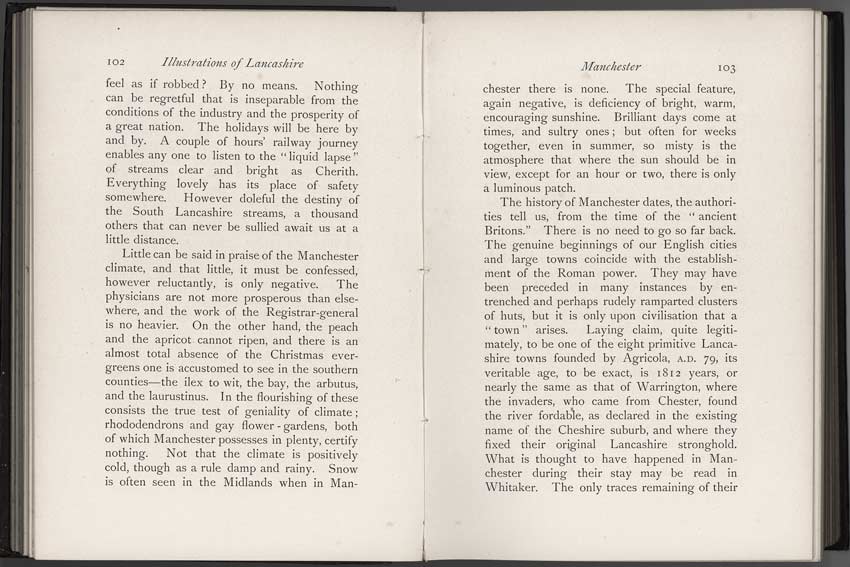102 Illustrations of Lancashire
feel as if robbed? By no means. Nothing can be regretful that is inseparable from the conditions of the industry and the prosperity of a great nation. The holidays will be here by and by. A couple 0f hours' railway journey enables any one to listen to the "liquid lapse " of streams clear and bright as Cherith. Everything lovely has its place of safety somewhere. However doleful the destiny of the South Lancashire streams, a thousand others that can never be sullied await us at alittle distance.
Little can be said in praise of the Manchester climate, and that little, it must be confessed, however reluctantly, is only negative. The physicians are not more prosperous than elsewhere, and the work of the Registrar-general is no heavier. On the other hand, the peach and the apricot cannot ripen, and there is an almost total absence of the Christmas evergreens one is accustomed to see in the southern counties - the ilex to wit, the bay, the arbutus, and the laurustinus. ln the flourishing of these consists the true test of geniality of climate; rhododendrons and gay flower-gardens, both of which Manchester possesses in plenty, certify nothing. Not that the climate is positively cold, though as a rule damp and rainy. Snow is often seen in the Midlands when in Man-
|
Manchester 103
chester there is none. The special feature, again negative, is deficiency of bright, warm, encouraging sunshine. Brilliant days come at times, and sultry 0nes; but often for weeks together, even in summer, so misty is the atmosphere that where the sun should be in view, except for an hour or two, there is only a luminous patch.
The history 0f Manchester dates, the authorities tell us, from the time of the "ancient Britons." There is no need to go so far back. The genuine beginnings of our English cities and large towns coincide with the establishment of the Roman power. They may have been preceded in many instances by entrenched and perhaps rudely ramparted clusters of huts, but it is only upon civilisation that a "town" arises. Laying claim, quite legitiimately, to be one of the eight primitive Lancashire towns founded by Agricola, A.D. 79, its veritable age, to be exact, is 1812 years, or nearly the same as that of Warrington, where the invaders, who came from Chester, found the river fordable, as declared in the existing name of the Cheshire suburb, and where they fixed their original Lancashire stronghold. What is thought to have happened in Manchester during their stay may be read in Whitaker. The only traces remaining of their
|

